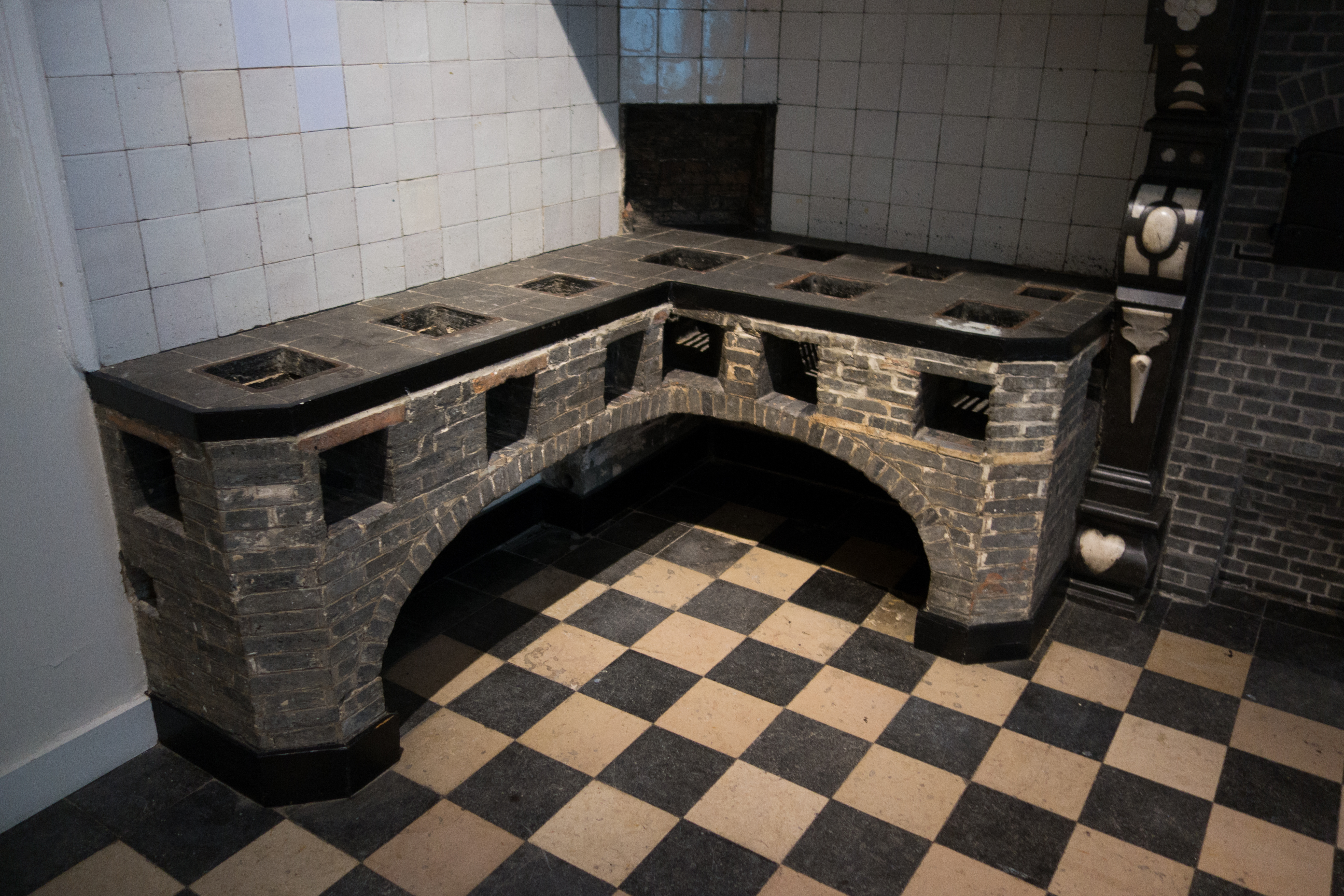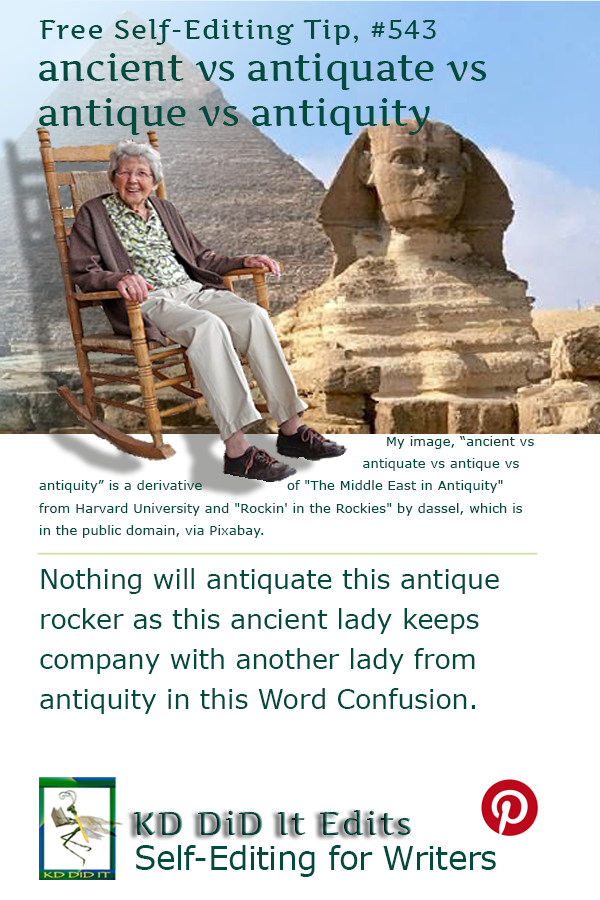Revised as of 31 August 2022
The commonality for this quartet of homonyms is that they’re all old.
The differences are less distinct between ancient and antiquity with the primary difference being the latter doesn’t apply to people. It is also “older” than ancient, as a matter of degree . . .
Antiquate is strictly a verb which causes things to become obsolete while antique is things which are old but valued. Yeah, we’re a throwaway society, so in general, those antiquated products are usually not valued.
Word Confusions . . .
. . . started as my way of dealing with a professional frustration with properly spelled words that were out of context in manuscripts I was editing as well as books I was reviewing. It evolved into a sharing of information with y’all. I’m hoping you’ll share with us words that have been a bête noire for you from either end.
If you found this post on “Ancient vs Antiquate vs Antique vs Antiquity” interesting, consider tweeting it to your friends. Subscribe to KD Did It, if you’d like to track this post for future updates.
| Ancient | Antiquate | Antique | Antiquity |
|---|---|---|---|

Old Woman of Bhaktapur – Kathmandu by A Vahanvaty from Dubai, UAE (Bhaktapur | Kathmandu) under the CC BY-SA 2.0 license, via Wikimedia Commons. — A beautiful ancient woman. |

Ancient Brick Stove by Thomas Quine is under the CC BY 2.0 license, via Wikimedia Commons. — Today’s electronic stoves have antiquated this brick stove. |
Salvador Ferrando Museum is Alejandro Linares Garcia’s own work under the CC BY-SA 3.0 license, via Wikimedia Commons. — Some beautiful antiques in this museum. |

Mycenaean Stirrup Vase at the Louvre was photographed by Jastrow and is in the public domain, via Wikimedia Commons. — This vase definitely qualifies as an antiquity, as it is dated back to the 14th–13th centuries BC. |
| Part of Grammar: | |||
| Adjective 1; Noun 1, 2
Plural for noun: ancients |
Verb, transitive
Third person present verb: antiquates |
Adjective; Noun; Verb, intransitive & transitive
Plural for the noun and third person present verb: antiques |
Noun
Plural: antiquities |
| Adjective: Belonging to the very distant past and no longer in existence 1
Very old
Being old in wisdom and experience
Noun: [the ancients] The civilized peoples, nations, or cultures of antiquity, as the Greeks, Romans, Hebrews, and Egyptians [the ancients] The writers, artists, and philosophers of ancient times, especially those of Greece and Rome [Archaic] A standard, flag, or ensign 2 [Obsolete] The bearer of a flag |
To make obsolete, old-fashioned, or out of date by replacing with something newer or better
To design or create in an antique style
|
Adjective: [Of a collectible object] Having a high value because of considerable age
Belonging to ancient times
Noting or pertaining to automobiles approximately 25 years old or more Of or belonging to the ancient Greeks and Romans [Of paper] Neither calendered nor coated and having a rough surface Noun:
The antique style, usually Greek or Roman, especially in art [Printing] A style of type Verb, intransitive:
Verb, transitive: To make or finish something, especially furniture in imitation of antiques To emboss an image, design, letters, or the like on paper or fabric |
The ancient past, especially the period before the Middle Ages
Great age |
| Examples: | |||
| Adjective: The ancient civilizations of the Mediterranean gave us so much in the sciences, maths, history, writings, law, and more. The only surviving wonder of the ancient world is the Great Pyramid of Giza. The most ancient bristlecone pine is named Methuselah and is estimated to be 4,841 years old. Oh, man, that’s ancient history, dude. The appearances of the Loch Ness monster are an ancient folk tale. They may be an ancient pair of jeans, but they’re my lucky jeans! Jeez, you make me feel ancient. Noun: The ancients of Rome and Greece included Plato, Socrates, Aristotle, Homer, Sappho, Virgil, Euripides, and more. A thorough knowledge of the ancients is a prerequisite of criticism. “Ensign” is a corruption of ancient and meant both a banner and the bearer of the banner. |
This latest device will antiquate the ice-cube tray.
Ford’s conception of the assembly line antiquated previous manufacturing processes. Henry enjoys antiquating furniture. This new furnace antiquates the old heating system. |
Adjective: We received an antique clock as a wedding gift. George gave the bookshelves an antique finish that is so warm and cozy. They were statues of antique gods. Can you believe trade unions are defending antique work practices? She was an antique divorcée in reduced circumstances. Noun: My friend has been an antique dealer for years. Helena prefers antiques to modern furniture. Some antique fonts include Coffee Tin, Old Newspaper Types, and Treasure Map Dead Hand. Verb, intransitive: We would often go antiquing in search of furnishings. Verb, transitive: Antiquing a piece of furniture adds such character. |
The great civilizations of antiquity include Greece, Rome, China, Mesopotamia, Egypt, the Indus River Valley, Peru, and Meso-America.
The Elgin Marbles are an extensive collection of Greek antiquities. Notre Dame Cathedral is a church of great antiquity. |
| Derivatives: | |||
| Adverb: anciently Noun: ancientness |
Adjective: antiquated, unantiquated Noun: antiquatedness, antiquation |
Adjective: antiqued, pseudoantique, quasi-antique, subantique Adverb: antiquely Noun: antiqueness, pseudoantique |
Noun: preantiquity, preantiquities, subantiquity, subantiquities |
| History of the Word: | |||
|
1400-50; late Middle English antiquat meaning old from the Medieval Latin antimac quātus meaning old, ancient, the past participle of antiquāre meaning to put in an earlier state; it’s a verbal derivative of the Latin antimac quus. | It was strictly an adjective in the late 15th century from the Latin antiquus, anticus meaning former, ancient, which is from ante meaning before. | Middle English from the Old French antiquite, from the Latin antiquitas, which is from antiquus meaning old, former. |
C’mon, get it out of your system, bitch, whine, moan . . . which words are your pet peeves? Also, please note that I try to be as accurate as I can, but mistakes happen or I miss something. Email me if you find errors, so I can fix them . . . and we’ll all benefit!
Satisfy your curiosity about other Word Confusions on its homepage or more generally explore the index of self-editing posts. You may also want to explore Book Layout & Formatting Ideas, Formatting Tips, Grammar Explanations, Linguistics, Publishing Tips, the Properly Punctuated, Writing Ideas and Resources, and Working Your Website.
Resources for Ancient vs Antiquate vs Antique vs Antiquity
Apple Dictionary.com
Dictionary.com: ancient, antiquate, antique
Dictionary.com: antiquity
Pinterest Photo Credits:
The Middle East in Antiquity from Harvard University and Rockin’ in the Rockies by dassel, which is in the public domain, via Pixabay.


